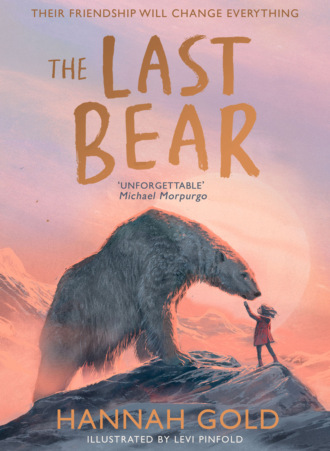
The Last Bear

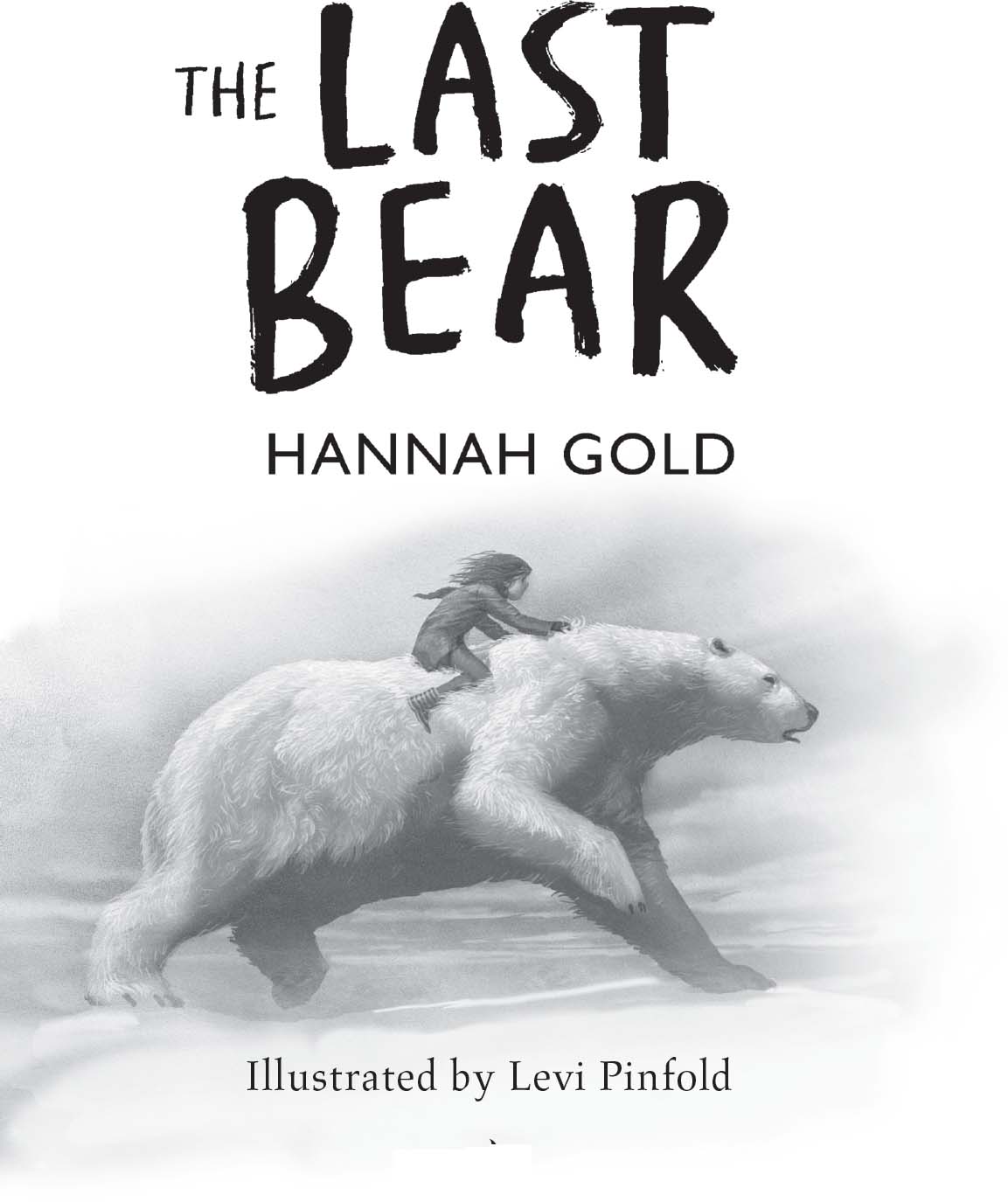

First published in Great Britain by HarperCollins Children’s Books in 2021
Published in this ebook edition in 2021
HarperCollins Children’s Books is a division of HarperCollinsPublishers Ltd
1 London Bridge Street
London SE1 9GF
www.harpercollins.co.uk
HarperCollinsPublishers
1st Floor, Watermarque Building, Ringsend Road
Dublin 4, Ireland
Text copyright © Hannah Gold 2021
Illustrations copyright © Levi Pinfold 2021
Cover illustrations copyright © Levi Pinfold 2021
Cover design copyright © HarperCollinsPublishers Ltd 2021
Hannah Gold and Levi Pinfold assert the moral right to be identified as the author and illustrator of this work respectively.
A catalogue record for this book is available from the British Library.
All rights reserved under International and Pan-American Copyright Conventions. By payment of the required fees, you have been granted the non-exclusive, non-transferable right to access and read the text of this ebook onscreen. No part of this text may be reproduced, transmitted, downloaded, decompiled, reverse engineered, or stored in or introduced into any information storage and retrieval system, in any form or by any means, whether electronic or mechanical, now known or hereinafter invented, without the express written permission of HarperCollins.
Source ISBN: 9780008411282
Ebook Edition © February 2021 ISBN: 9780008411299
Version: 2021-01-21

To my parents, the planet and polar bears everywhere
Contents
Cover
Title Page
Copyright
Dedication
Map
Chapter One: The Letter
Chapter Two: Bear Island
Chapter Three: A Gift of Time
Chapter Four: Exploration
Chapter Five: Walrus Bay
Chapter Six: Hurt
Chapter Seven: April’s Decision
Chapter Eight: Bear
Chapter Nine: Friendship
Chapter Ten: The Midnight Sun
Chapter Eleven: The Weather Cabin
Chapter Twelve: A Secret Shared
Chapter Thirteen: No More School
Chapter Fourteen: Bear Ride
Chapter Fifteen: The Cave
Chapter Sixteen: Lessons in Roar
Chapter Seventeen: The Island Speaks
Chapter Eighteen: Mountain Summit
Chapter Nineteen: Bear’s Story
Chapter Twenty: Trapped
Chapter Twenty-one: The Plan
Chapter Twenty-two: An Unwanted Surprise
Chapter Twenty-three: No More Time
Chapter Twenty-four: The Boat
Chapter Twenty-five: The Storm
Chapter Twenty-six: Where’s Bear?
Chapter Twenty-seven: Courage
Chapter Twenty-eight: Svalbard
Chapter Twenty-nine: The Last Roar
Author’s Note
Resources
Acknowledgements
About the Publisher
Map
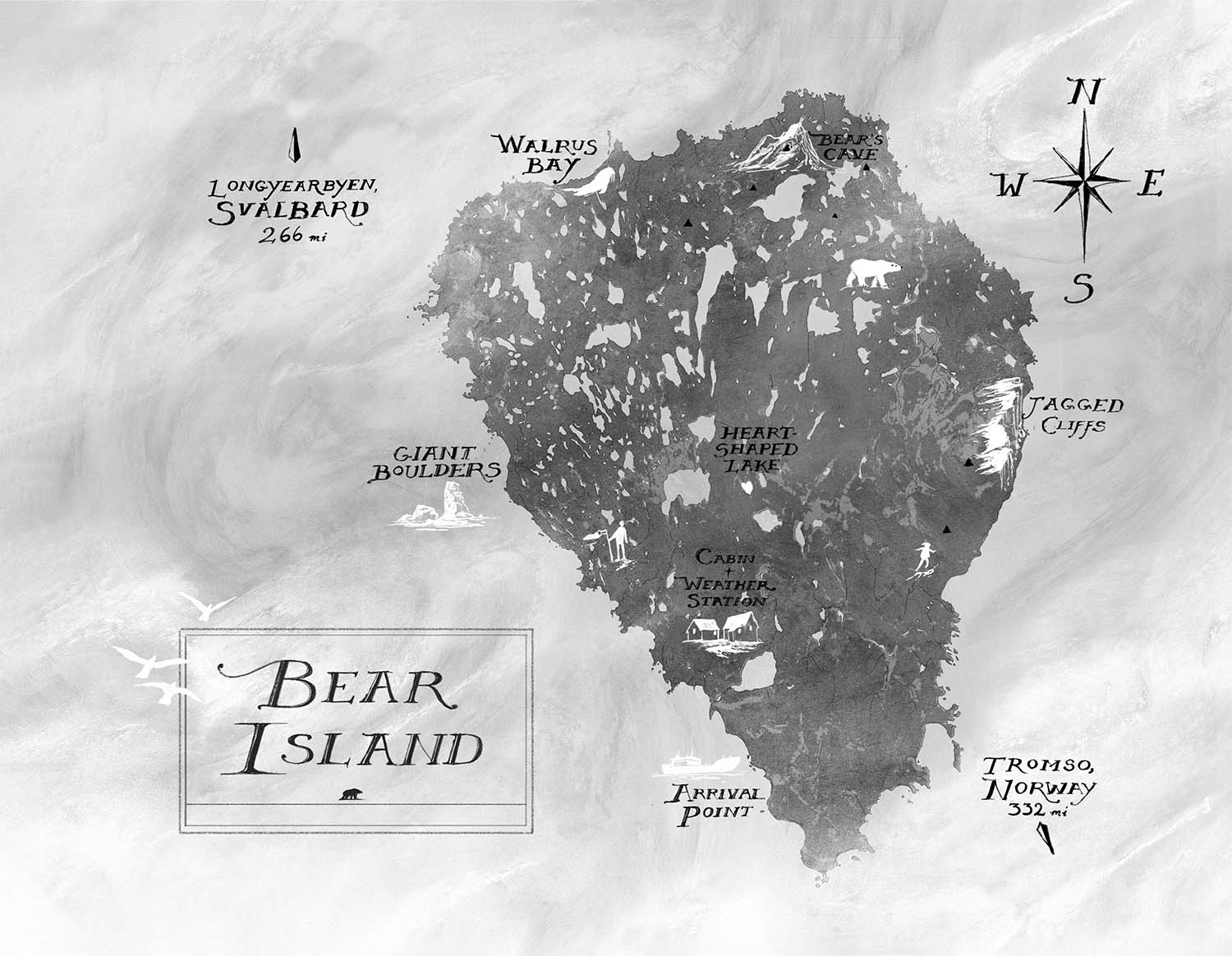
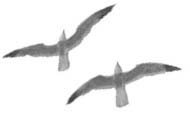
CHAPTER ONE
The Letter
APRIL WOOD CAME face to face with the polar bear exactly three weeks after she had arrived on Bear Island. But before that, she had to get to Bear Island in the first place, and that journey began approximately four months earlier.
Up until that point, there had been a normality to April’s everyday life, although she was the first to admit it was a rather odd kind of normality. Her father worked as a scientist in a nearby university, where he spent his days researching weather patterns. Like the weather, he came and left the house at the most unpredictable of times – sometimes he’d get home at eleven p.m., or he would leave just when she got home from school. He worked random weekends but would then have three days off in the week. Even then he would shut himself in his study and bury his face in dusty, old books with writing so tiny it made your eyes hurt just to read them. When April brought him a pot of tea or his dinner, he would shake his head, take off his glasses and look at her curiously as if he had completely forgotten he had a daughter. ‘Oh,’ he would say. ‘Thank you … April.’ Then he would put his head back down, chew the top of his pen and she would gently close the study door behind her.
April was only four when her mother died and whenever she thought of her, it was like thinking of a lovely summer holiday she’d once been on. Her father hadn’t remarried and it showed in the house. It was tall and thin and looked ever so slightly unhappy around the edges, and inside it always felt cold. There was a thin layer of dust coating everything, and a horrible feeling of something missing – a feeling that April never quite knew how to put into words.
And so she spent most of her time in the back garden, where, in the wild, unkempt bramble bush, a family of urban foxes lived. She was fascinated by one in particular, who she called Braveheart, because he seemed bolder than the others and because once he’d almost allowed her to feed him some strawberries from her hand. Time spent in the garden whizzed by and was only interrupted by school. April didn’t like school, or the girls at the school didn’t like her. She didn’t know whether it was because she smelled of fox or the fact she was the smallest girl in her class or even that she cut her own hair with a pair of garden scissors. Either way, April didn’t mind too much because she preferred animals to humans anyway. They were just kinder.
Then the letter arrived.
April was eating a bowl of cornflakes cross-legged on the floor whilst on the other side of the living room, her father dangled a piece of toast dripping with marmalade over today’s newspaper. It was the end of November, and April raced to the door when the post landed with a thud on to the mat. Maybe it would be a Christmas card from Granny Apples? She not only liked to send her cards early but was also her favourite grandmother because she smelled of warm, sugary pastry and lived next to the sea.
There were no Christmas cards, but there was a big fat envelope marked OFFICIAL GOVERNMENT BUSINESS and it was postmarked Norway.
She placed it by her father’s toast and he absentmindedly picked it up to take a bite. When he realised what it was, a funny look passed over his face, as if someone had cast a magic spell into his eyes.
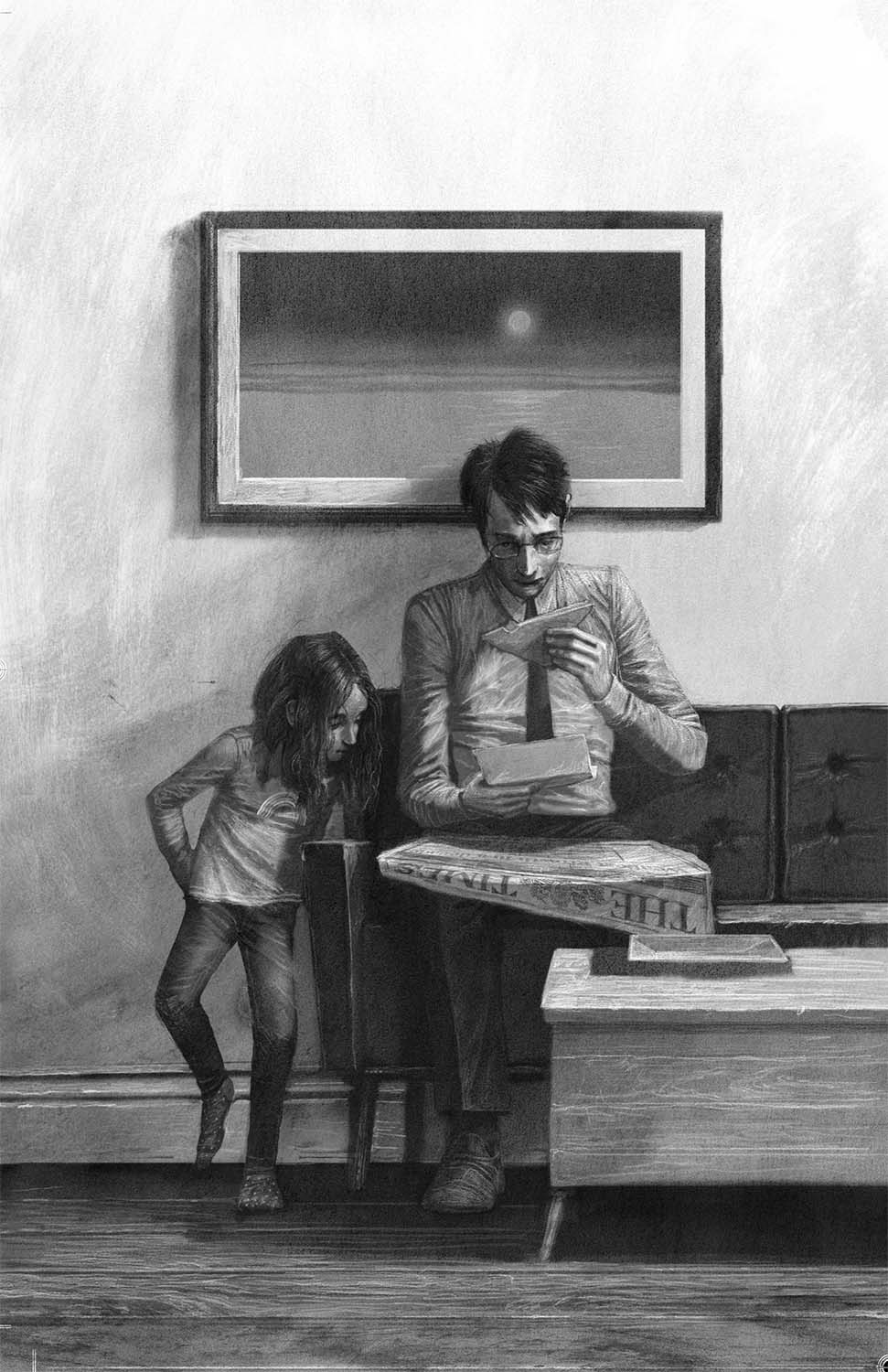
‘What is it?’ she asked him.
‘We’re going to the Arctic Circle,’ he said, reading the letter and blinking fast. ‘I got the job. I didn’t think I would, to be honest – I thought they would choose someone local. But apparently my research paper on the scientific study of the earth’s atmosphere swayed them. It’s a weather station on a small island about a day’s boat journey away from the coast of Norway.’
April hopped up and down before answering. ‘What kind of island? How many people live there?’
‘Ah.’ He looked down sheepishly. ‘It’s not that kind of island. In fact … there won’t be anyone there but us.’
‘Just us two?’ Something fizzy rushed through her. ‘On an island all alone?’
He leaned forward in his chair. ‘Think of the adventures we will have. We’ll be like Scott of the Antarctic. The island is nothing like here – it’s got inland lakes, mountains, streams. Imagine it, April. It’s the last great unknown. There’ll be no cars, trains, planes. No roads even! It’s pure, untouched wilderness.’
He didn’t need to say anything more because her heart was already racing ahead. Not only would they be in the Arctic Circle, but they would also have all this time together. Just them. They would be able to do so many things – like building snowmen, sledging down mountains and—
‘Of course, my work there will be very important,’ Dad added with his most serious face and her insides crumpled the tiniest bit.
‘What will you be doing?’
‘The Norwegian government wants a more accurate representation of how global warming is affecting the Arctic region, so I’ll be monitoring the data over a six-month period.’
April knew a lot about melting ice caps and, along with fox hunting, it was one of the things that made her feel both angry and useless at the same time.
‘And my school?’ she asked.
‘April,’ he said, leaning forward. ‘Six months in the Arctic will teach you more than six years at school ever will.’
She took a second look at him. His eyes were bright and there were two pink spots of colour on his cheeks. The feeling fizzed through her again.
‘When do we go?’
Of course, not everyone was as excited. Granny Apples phoned at least three times a day to tell them how reckless they were being. What about the freezing cold temperatures, the waves as tall as skyscrapers, the killer walruses with sharp tusks she’d seen on one of those David Attenborough documentaries or the dangers of an island where there was no hospital, local GP or even anybody else at all who could help them should they get into danger?
It just wasn’t right for a girl of eleven, she said. Especially such a sensitive girl as April, who, thanks to her father, was feral enough already. How could he possibly think going away to a deserted island – and not even a sunny one at that – was in her best interests?
But Dad was stubborn when he wanted to be and just pretended not to hear.
‘For goodness’ sake, Edmund,’ she bellowed at him in frustration. ‘It’s called Bear Island. What if she gets eaten?’
Although he tried to reassure her that there were no bears on Bear Island, Granny Apples refused to listen.
‘If you see a polar bear, April,’ she said, ‘remember to RUN.’
So it was that on 1 April, they started the first leg of their journey. They were to fly to Oslo, then change planes and head to a small town called Tromsø – and from there take a boat to Bear Island. As the plane took off and turned its nose north, April pressed her face to the window and looked down on her disappearing home.
This was it.
They were heading to the Arctic Circle.

CHAPTER TWO
Bear Island
‘YOU KNOW YOUR father is irresponsible?’
April jumped at the sudden noise, bashing her elbow against the metal railing. The seagull she’d been feeding out of her hand with biscuit crumbs flew off with an indignant squawk.
At her side was a boy she’d last heard swearing loudly dockside at Tromsø as he lifted Dad’s entire Mozart collection and record player on to the slightly rusty Norwegian cargo ship they had found to take them to Bear Island. He was the captain’s son and perhaps two or three years older than her. Up close, he smelled of brine and engine juice and something else she couldn’t identify. But then again, everything had been different – wilder and emptier – since they’d left, so perhaps he didn’t smell unusual at all.
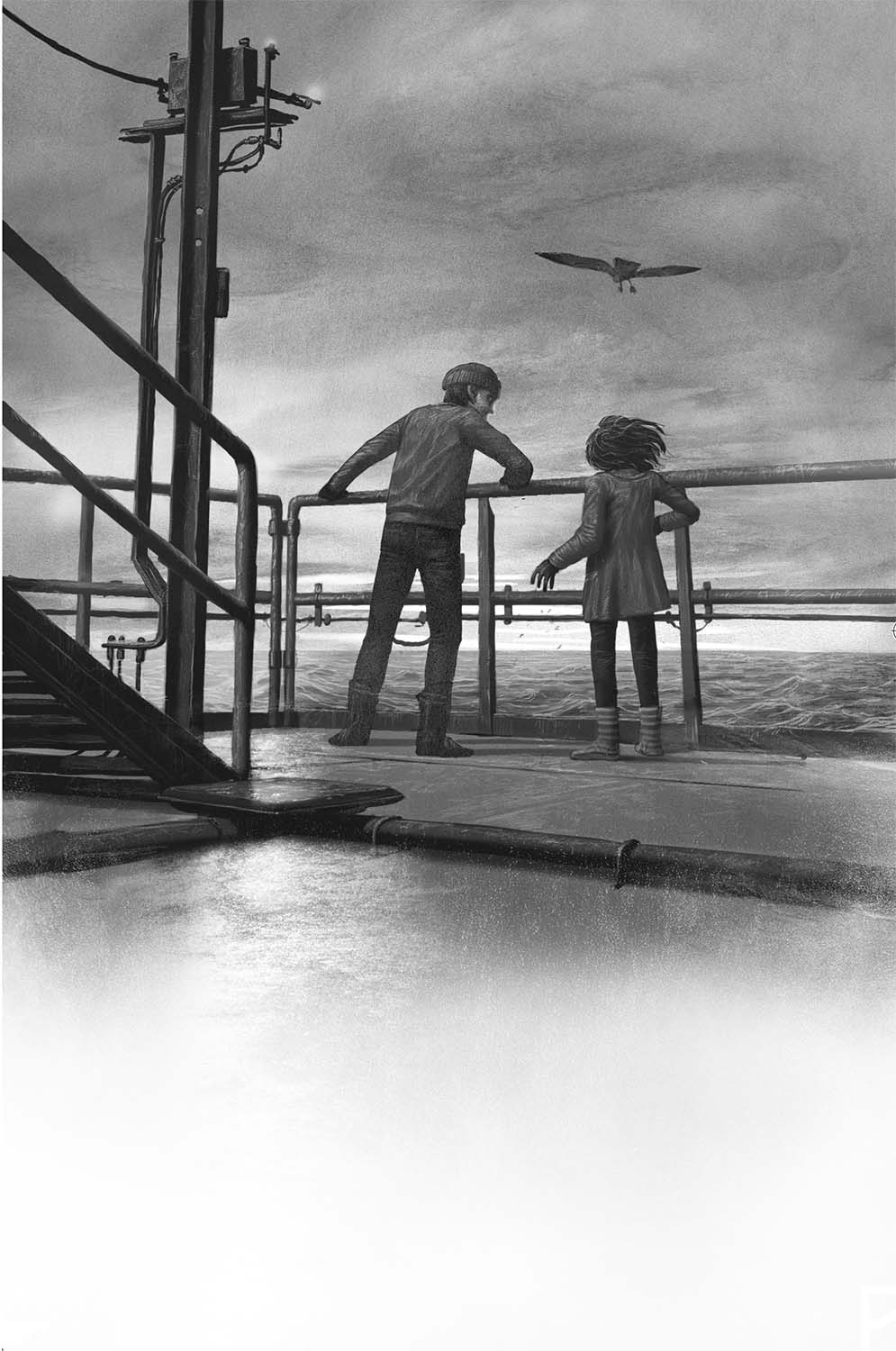
But still. That didn’t make his words acceptable and they definitely didn’t justify a reply. Not only that, but she didn’t trust herself to speak as the peanut butter sandwich she’d eaten earlier was perilously close to coming back up again.
‘I would lie down if I were you,’ the boy instructed and pointed to the bench that sat tucked under the bow. ‘It will help with the seasickness.’
April looked at the hard wooden bench dubiously. But after another violent heave she edged towards it and lay down so all she could see was sky. Tucked down here, she was at least shielded from the unrelenting wind that stung her face red raw. She expected the boy to disappear, but instead he sat quietly at the end of the bench and picked the dirt out from under his fingernails.
‘He’s not irresponsible,’ she said, when her stomach finally started to feel less queasy. ‘He’s a scientist.’
‘That is even worse,’ the boy said, turning to face her.
‘My father says the weather station on the island has been staffed since 1918.’
‘Yes! But not by a … girl.’
‘I don’t know why you have to say girl in that tone of voice.’ April sat up indignantly. ‘Just because I’m not a boy doesn’t mean I’m weak. I once climbed the horse chestnut tree in our back garden right to the very top so I could rescue our next-door neighbour’s cat!’
The boy didn’t reply. Instead he laughed one of those big belly laughs and spanned his arms to indicate the huge expanse of mottled sky, the rough, tumbling seas and the feeling like they weren’t even on Earth at all. ‘What do you know about this part of the world?’ he asked, once he had finished laughing. ‘Have you ever been this far north?’
‘I know you are a rude boy,’ said April. ‘And I know if I were in your shoes I would be a lot more helpful about what to expect. Besides, I’m not scared of the unknown.’
Something in his face softened. ‘Tör,’ he said, holding out his hand. ‘Don’t mind us. My father and I spend so long at sea we forget how to be human.’
‘April. April Wood.’
She shook his hand. It felt like old rope but strangely comforting too. Like a hand that could pull her out of trouble.
‘Is it dangerous?’ she asked in a quiet voice.
‘It is wild,’ said Tör. ‘And all wild things are dangerous.’
‘But there are no polar bears?’
Tör shook his head. ‘Not for years. But why the sad face? Polar bears are not friendly animals. They are not pets. They’ll eat a girl like you alive.’
April pretended to stare at the sea rather than look at his silly grin.
‘By the way, I don’t understand your trick with the seagull.’
‘What trick?’ April turned back to face him.
‘How you got it to eat out of your hand.’
‘It’s not a trick,’ she said, bristling at the assumption. ‘I’ve just learned how to make animals feel safe with me.’
Tör raised an eyebrow, but something in his face invited conversation.
‘It’s about listening to them,’ she explained, touching her heart. ‘Here.’
‘You’re different,’ he said.
‘So, I’m not just a girl then?’
Tör smiled and it was such a wide-open smile that April couldn’t help but grin back.
‘When you are on the island, you won’t be able to leave. You know that, don’t you?’ he said, lowering his tone. ‘Not until we come in six months to pick you up.’
April had the sense there was something else. She was clever at hiding the things she really wanted to say, especially around her father, and had a sixth sense when someone else was doing the same. She waited for him to say it because whatever it was, she would rather know. But in the end, he pulled out a pencil stub from his jacket and scrawled his number on the back of an envelope he had stuffed in his pocket.
‘Bear Island is a hard place. You be careful, April Wood,’ he said. ‘And if you ever need me, at all, just call this number.’
She couldn’t imagine why she would need him, but she tucked it in her coat pocket just in case. Then she watched as he rejoined his fellow crewmen, who, with their strong, sturdy limbs, weather-cracked hands and stoic faces, made her father look like he was made of parchment. Since leaving port, he had shut himself in their cabin and surrounded himself with books to prepare himself for his new job. And because she knew he didn’t want to be disturbed and because the cabin smelled of mackerel, she settled back down on the bench and fell asleep.
‘Land ho!’ The call echoed throughout the ship like the way a church bell calls out a wedding. ‘Land ho!’
April pulled herself upwards, her head groggy with dreams, and then had to blink twice to make sure she was seeing correctly. Standing before her on deck was Tör, with his palm outstretched and a hunk of bread sitting on it. As he gazed skywards, his face carried the kind of hopeful expression she’d worn on her first day at school. Something in it made her lean towards him.
‘You need to keep your body a bit lighter and stop holding your breath.’
‘Like this?’ he said, as he dropped his shoulders and let his arm relax.
‘More from the inside,’ April instructed. ‘As if you’re made of water. How it’s all soft and gentle. That’s it. Nice and easy. Now don’t move. He’s right there above you. Quiet now and—’
‘Tör!’ the captain yelled across the deck and the seagull squawked as it shot into the sky.
April shied backwards. She didn’t know what to make of the captain, who was unlike anyone she had ever met before.
‘I hope you’re not distracting our guests,’ he said, taking a curious glance at the bread in Tör’s hand. ‘We need your help at the bow.’
Tör dropped the bread and ran off whilst April held her breath as the captain’s gaze raked over her. There was something fierce in his face, as if he had got so used to the wild north seas he had forgotten where he ended and they began. For once, she was glad of her height and the way it made her invisible.
Without another word, he strode away and April breathed out a long sigh of relief.
Around her, the deck was busy with crewman and their quick, efficient activity. She couldn’t see Tör, but her father was impossible to miss. He was leaning over the bow of the ship, wearing his tweed jacket and pressed suit trousers – oblivious to the freezing temperatures – and staring in awe at the horizon. She edged closer to him and, even over the smell of the sea, she breathed in the familiar scent of the aniseed candy he liked to suck.
‘Dad?’
‘We’re here, April! We’re here!’ he said, without breaking his gaze. ‘We’ve made it.’
He pointed to something, but she couldn’t see anything apart from sea spray, rolling gunmetal waves and a sense they were entering a forbidden part of the universe.
‘Isn’t she beautiful?’
The island finally came into view, the way that you twizzle the nozzle on the binoculars and suddenly things become clear and sharp.
‘Bear Island,’ he said in a hushed voice full of awe and wonder.
Конец ознакомительного фрагмента.
Текст предоставлен ООО «ЛитРес».
Прочитайте эту книгу целиком, купив полную легальную версию на ЛитРес.
Безопасно оплатить книгу можно банковской картой Visa, MasterCard, Maestro, со счета мобильного телефона, с платежного терминала, в салоне МТС или Связной, через PayPal, WebMoney, Яндекс.Деньги, QIWI Кошелек, бонусными картами или другим удобным Вам способом.

